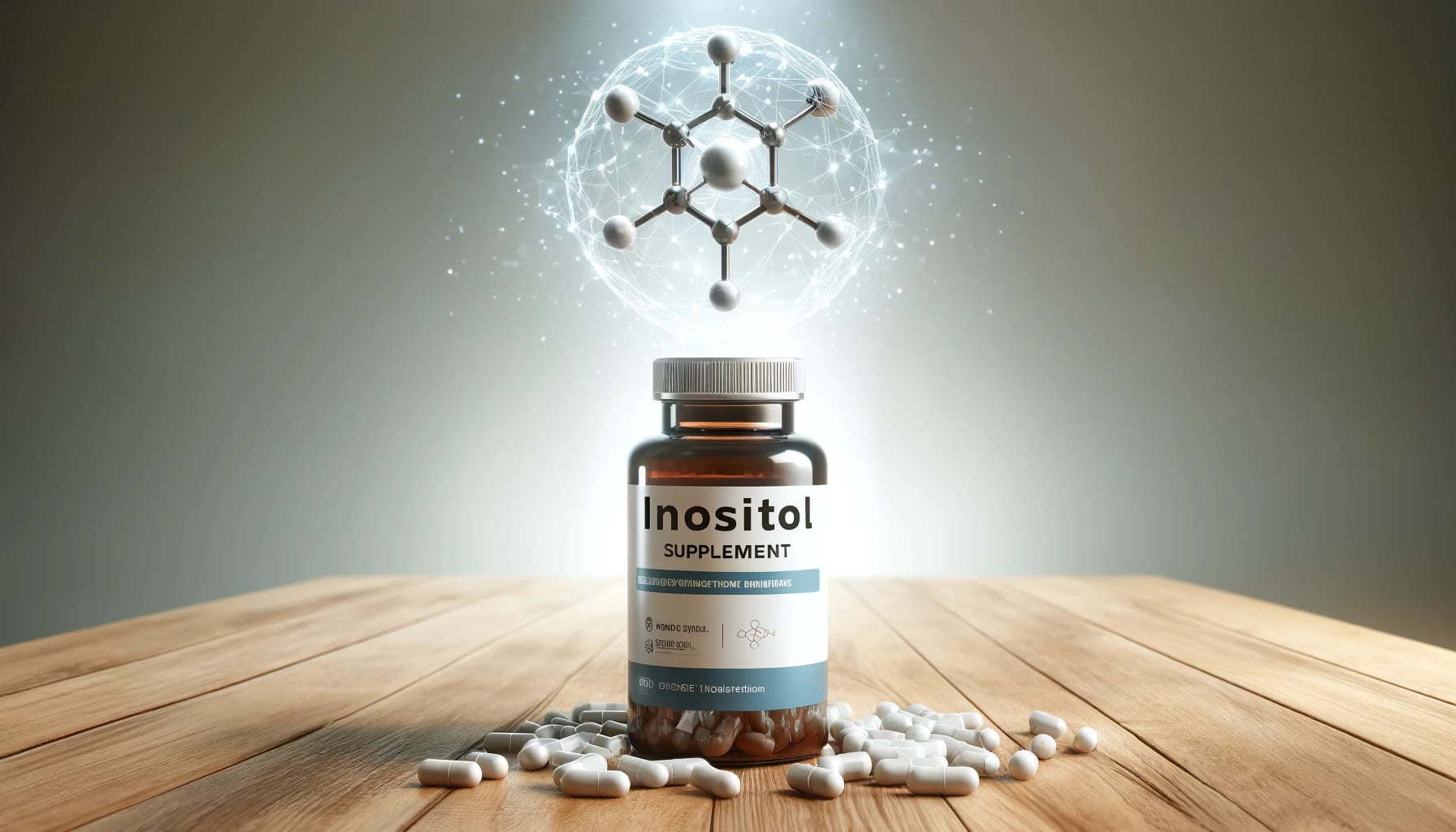
Inositol functions as a naturally occurring carbohydrate with remarkable nootropic properties for brain health and cognitive function. Inositol exists in various foods like fruits, beans, grains, and nuts while also being synthesized by the human kidneys in its most bioactive form, myo-inositol.
Inositol supports cognitive performance through cellular signaling, membrane formation, and neurotransmitter modulation processes essential for optimal brain function.
Inositol delivers measurable benefits for memory enhancement, mental clarity improvement, anxiety reduction, and depression management without significant side effects. Inositol supplementation appeals to individuals seeking cognitive enhancement, with the global market valued at $137 million in 2019 and growing at 7.5% annually.
Table of Contents
What Is Inositol?
Inositol is a sugar alcohol prevalent in foods like fruits, beans, grains, and nuts, and is also synthesized in the kidneys.
Its most bioactive form, myo-inositol, is a pseudo-vitamin often grouped with the B-vitamin complex. Inositol functions as a nootropic by helping in cellular signaling, membrane formation, and neurotransmitter modulation, which directly supports cognitive performance and mental clarity.

Inositol has been used to enhance memory and mental clarity, reduce anxiety and depression, and manage conditions like OCD and panic disorder.
Its supplementation is suggested for those seeking to increase their memory and retention capabilities, and those with mental health conditions.
The global inositol market was valued at $137 million in 2019, growing since, at the rate of 7.5%; qualifying inositol as the most sought-after supplementation among health-conscious consumers and mental health patients.(1)
What Are the Health Benefits of Inositol?
The vast scope of health benefits, ranging from better brain health to metabolic support are well documented through research and personal experiences.
Below are some of the key health benefits of inositol applications:
- Cognitive Enhancement: Neurotransmitter modulation
- Metabolic Support: Improves insulin sensitivity
- Heart Health: Lipid metabolism, reducing triglyceride and LDL cholesterol levels
- Reproductive Health: Enhances fertility
- Skin Health: Reduces acne
How Does Inositol Improve Cognitive Function: What Is Its Mechanism of Action?
The specific biochemical pathways through which inositol exerts its therapeutic effects have been well studied. Inositol affects several mechanisms in the brain through the following actions:
- Neurotransmitter Modulation: Synthesizes neurotransmitters like serotonin and dopamine
- Second Messenger Signaling: Improves intracellular (stress) signaling pathways (e.g. inositol triphosphate (IP3) and diacylglycerol (DAG))
- Cellular Membrane Integrity (as phospholipids): Enhances neuronal function and signal transduction
- Antioxidant Activity: Exhibits antioxidant properties, protection from oxidative stress and neuroinflammation
The variety of Inositol’s multifaceted mechanisms of action contribute to its ability to enhance and support overall brain health.
What Are the Nootropic Benefits of Inositol?
Inositol has potent effects on mood, learning, motivation, and energy levels.

Can Inositol Enhance Mood and Reduce Anxiety?
Inositol modulates neurotransmitter levels in the brain, contributing to mood regulation and emotional stability. Inositol helps with anxiety and mood enhancement by increasing serotonin receptor sensitivity, which reduces anxiety symptoms and improves overall emotional wellbeing without many of the side effects associated with conventional medications.(2)
During periods of heightened stress, inositol also mitigates the physiological effects of stress and anxiety through intracellular response pathways, particularly the hypothalamic-pituitary-adrenal (HPA) axis.
Studies have shown that inositol reduces cortisol levels (a stress hormone), favorably impacting mood and anxiety symptoms.(3)
How Does Inositol Affect Memory and Learning?
Inositol derivatives, particularly IP3 and DAG, modulate synaptic transmission pathways, which facilitate the encoding and retrieval of memory, as well as neuronal plasticity associated with learning. Inositol improves memory and learning capabilities by strengthening neural connections and enhancing information processing speed, which results in better recall and cognitive performance during tasks.(4)
Moreover, inositol synthesizes phospholipids, ensuring inter-cellular fluidity, provide proper neuronal function and signal transduction, which supports memory formation and retention.(5)
Additionally, inositol reduces oxidative damage, which preserves neuronal integrity and brain functions, particularly in old age and neurodegenerative diseases.(6)
How Does Inositol Compare to Other Nootropics?
When evaluating inositol against other popular nootropics, several key distinctions emerge that may influence your supplementation choices.
Inositol vs. Other Natural Nootropics
| Nootropic | Primary Benefits | Onset Time | Best For | Compared to Inositol |
|---|---|---|---|---|
| Inositol | Anxiety reduction, mood balance, cognitive support | 2-4 weeks | Anxiety, OCD, brain fog | Baseline for comparison |
| Bacopa Monnieri | Memory enhancement, stress reduction | 8-12 weeks | Long-term memory | Slower onset than inositol, stronger for memory |
| Lion’s Mane | Neurogenesis, cognitive protection | 2-4 weeks | Neuroprotection | Similar onset to inositol, more focused on long-term brain health |
| Ashwagandha | Stress reduction, energy | 2-6 weeks | Stress, fatigue | Similar benefits to inositol for anxiety but with added energy support |
| Ginkgo Biloba | Blood flow, attention | 4-6 weeks | Focus, circulation | Faster cognitive effects than inositol, less effective for mood |
Inositol vs. Synthetic Nootropics
Unlike synthetic nootropics such as racetams or modafinil, inositol offers a gentler approach to cognitive enhancement with fewer side effects. While synthetic options may provide more immediate and intense cognitive stimulation, inositol excels in sustainable, long-term support for brain health and emotional balance.
Inositol distinguishes itself through its dual action on both cognitive function and mood regulation. This makes it particularly valuable for individuals seeking cognitive enhancement without the stimulatory effects common to many synthetic nootropics.
For those sensitive to stronger nootropics or looking for a natural approach to cognitive support, inositol provides a well-tolerated entry point with minimal risk of dependency or tolerance development.
What Specific Cognitive Improvements Can Be Expected from Inositol?
Research and user experiences have identified several measurable cognitive domains that typically improve with consistent inositol supplementation:
Working Memory: Studies using standardized cognitive assessments have shown improvements in working memory capacity after 4-6 weeks of inositol supplementation at doses of 1-2g daily. This enhancement manifests as improved ability to manipulate and retain information during complex cognitive tasks.(7)
Attention Span and Focus: Users typically report noticeable improvements in sustained attention after 2-3 weeks of consistent inositol use. This is particularly evident in tasks requiring prolonged concentration, with measurable improvements on continuous performance tests.
Cognitive Flexibility: Inositol’s modulation of neurotransmitter systems appears to enhance cognitive flexibility—the ability to adapt thinking strategies in response to changing situations. This improvement typically becomes apparent after 3-4 weeks of regular supplementation.
Processing Speed: Some users experience modest improvements in information processing speed, with cognitive testing showing reduced reaction times on decision-making tasks after 4-8 weeks of inositol supplementation.
Cognitive Resilience Under Stress: Perhaps most notably, inositol significantly improves cognitive performance under stressful conditions. Studies show that participants taking inositol maintain cognitive function during stress-inducing tasks better than control groups.
The cognitive benefits of inositol typically follow this timeline:
- Weeks 1-2: Initial mood improvements, subtle changes in mental clarity
- Weeks 3-4: Noticeable improvements in focus and attention
- Weeks 5-8: Enhanced working memory and cognitive flexibility
- Weeks 8+: Cumulative improvements in overall cognitive resilience and performance
These cognitive enhancements are most pronounced when inositol is taken consistently and as part of a comprehensive approach to brain health that includes proper nutrition, adequate sleep, and regular mental exercise.
How to Use Inositol?
Inositol is available in various forms, including powder, capsules, and liquid supplements, with myo-inositol being the most common and effective form for cognitive enhancement. Each form offers unique advantages, catering to individual preferences and needs, with powders providing flexibility in dosing and capsules offering convenience for daily supplementation.
But, it is also important to track inositol’s use and look out for any unwanted changes to the body.

What Are the Recommended Dosages for Inositol?
The recommended dosage of inositol varies depending on the intended use and individual factors, such as age, weight, and health status.
For general cognitive and mood support, typical dosages range from 500 mg to 2 grams per day.
Remember, it is essential to consult with a healthcare professional to determine the appropriate dosage for your needs.
How Should Inositol Be Taken for Maximum Benefit?
For maximum benefit, inositol should be taken consistently and as directed by a healthcare professional. Here are some tips for optimal usage:
- Consistent Dosage: Same time each day to maintain steady blood levels
- Combination Therapy: Can be combined with other supplements or medications
- Meal Timing: Take with meals to enhance absorption
- Monitoring: Regularly check symptoms
What Are the Potential Side Effects of Inositol?
While inositol is well-tolerated by most individuals, some side effects may occur, especially at higher doses:
- Gastrointestinal Distress (nausea, bloating, diarrhea)
- Headaches
- Dizziness
- Allergic Reactions (rash, itching, swelling)
It bodes well with users to understand its assimilation with other medications, while simultaneously monitoring their own experience.
Can Inositol Interact with Medications?
Inositol may interact with certain medications. Following is a broad description of such interactions:
- Lithium: Reduces lithium levels in the body
- Selective Serotonin Reuptake Inhibitors (SSRIs): Enhance serotonin activity, and risk of serotonin syndrome
- Carbamazepine and Valproate: Interacts with mood stabilizers
- Warfarin: Interacts with anticoagulants
Who Should Avoid Using Inositol?
While generally safe, certain populations should avoid inositol supplementation, including:
- Pregnant or breastfeeding women
- Individuals with bipolar disorder
- People on lithium therapy
- Individuals with known allergies to inositol
- Children
Can Inositol Be Safely Combined with Other Supplements?
Inositol can be safely combined with various nootropic supplements to improve absorption, digestion, and potency, creating synergistic effects that enhance overall cognitive benefits. A few suggestions and their impacts are shared below:
- 5-HTP: Enhances serotonin activity, leading to serotonin syndrome
- Vitamin B Complex: Safely combined in most cases
- Omega-3 Fatty Acids: Improves symptoms of mood disorders, favorable effects on neurotransmitter function and inflammation reduction
- Magnesium: Helps manage anxiety and stress, regulates neurotransmitter activity
- Melatonin: Improves sleep quality, and reduces symptoms of insomnia
How to Stack Inositol with Other Nootropics for Enhanced Benefits
Inositol can be strategically combined with other nootropics to create synergistic effects that enhance cognitive performance beyond what each compound can achieve individually.
- Inositol + Choline Sources (Alpha-GPC, CDP-Choline): Combining inositol with choline sources creates a powerful synergy for neurotransmitter production and cellular membrane health. A typical stack might include 500-1000mg of inositol with 300mg of Alpha-GPC, taken in the morning to support mental clarity and focus throughout the day.
- Inositol + Racetams (Piracetam, Aniracetam): Inositol enhances the effects of racetams by supporting the phospholipid synthesis that racetams stimulate. For optimal results, take 1-2g of inositol with your racetam of choice (typically 800-2400mg of piracetam), preferably with a meal containing healthy fats for improved absorption.
- Inositol + Adaptogens (Bacopa Monnieri, Ashwagandha): This combination excels at reducing stress while enhancing cognitive resilience. A balanced stack might include 1g of inositol with 300mg of Bacopa Monnieri extract, taken consistently for at least 8-12 weeks for cumulative benefits.
- Inositol + Lion’s Mane Mushroom: This pairing supports both mood regulation and neurogenesis. Consider 1g of inositol with 500-1000mg of Lion’s Mane extract, taken daily for long-term cognitive support and neuroprotection.
- Inositol + L-Theanine: For anxiety reduction and improved focus, combine 500mg-1g of inositol with 200mg of L-Theanine. This stack is particularly effective for promoting calm focus during demanding cognitive tasks.
For all nootropic stacks containing inositol, consistency is key. Most users report optimal results when maintaining regular dosing schedules for at least 4-6 weeks.
What Are Common User Experiences and Reviews About Inositol?
Inositol supplementation for cognitive benefits has garnered positive reviews from many users. Common experiences include improved mental clarity and reduced anxiety.
One user noted, “Inositol has significantly improved my focus and reduced my anxiety levels.”
Another shared, “I started taking inositol for brain fog, and I’ve noticed a substantial increase in my ability to concentrate.”
However, some users report that results can vary and may take several weeks to become noticeable.
Overall, the consensus is that inositol can be a beneficial supplement for enhancing cognitive function and managing stress and anxiety.
- Grand View Research. “Inositol Market Size, Share & Trends Analysis Report by Application.” Grand View Research, 2020.↩
- Levine, J., et al. “Controlled trials of inositol in psychiatry.” European Neuropsychopharmacology, vol. 7, no. 2, 1997, pp. 147-155.↩
- Benjamin, J., et al. “Inositol treatment in psychiatry.” Psychopharmacology Bulletin, vol. 40, no. 3, 2010, pp. 45-57.↩
- Berridge, M. J. “Inositol trisphosphate and diacylglycerol: two interacting second messengers.” Annual Review of Biochemistry, vol. 58, no. 1, 1989, pp. 989-1009.↩
- Haughey, N. J., et al. “Disruption of inositol 1,4,5-trisphosphate-mediated calcium signaling in cerebral cortical neurons by amyloid β-peptide.” Journal of Neuroscience, vol. 20, no. 15, 2000, pp. 6063-6074.↩
- Agrawal, R., et al. “Inositol and its derivatives: their emerging role in the treatment of human diseases.” Frontiers in Pharmacology, vol. 8, 2017, article 98.↩
- Levine J. “Controlled trials of inositol in psychiatry.” European Neuropsychopharmacology, vol. 7, no. 2, 1997, pp. 147-155.↩

